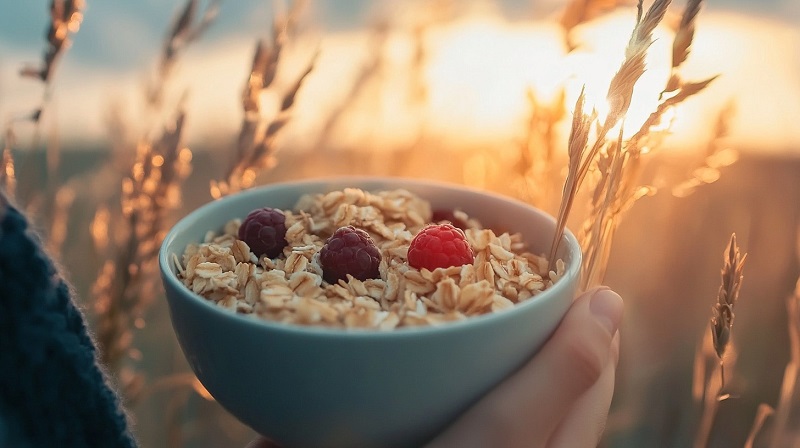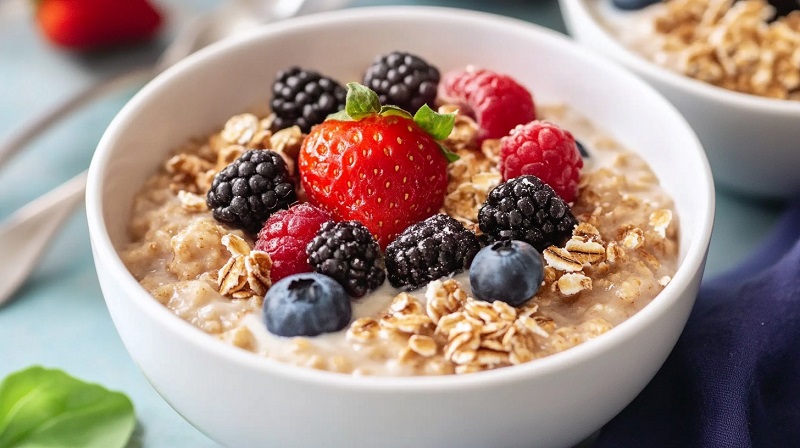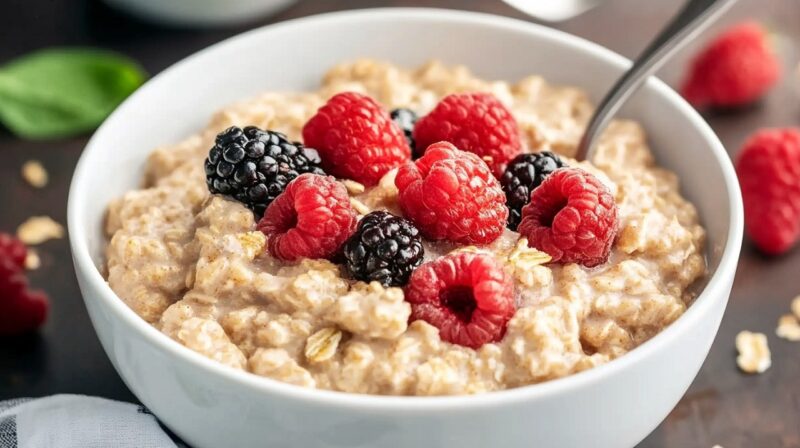Oatmeal works quietly. It fills the stomach, gives lasting fuel, and digests at a pace that helps the body stay balanced.
Some types break down fast. Others take their time. That difference can shape energy, hunger, and focus for the rest of the day.
A warm bowl in the morning does more than comfort. It plays a role in heart health, blood sugar, and digestion. Each bite begins a process inside that deserves attention.
Here is what actually happens after you eat oatmeal.
Key Insights
- Oatmeal digests slowly, with steel-cut oats taking up to 4 hours and instant oats breaking down much faster.
- Its beta-glucan fiber helps lower blood sugar spikes, supports heart health, and keeps hunger away longer.
- Best results come from less processed oats eaten in the morning, paired with protein for steady energy.
How Oatmeal Breaks Down and Why Type of Oat Matters
Oatmeal does not move through the body in a rush. Its structure, fiber content, and level of processing shape how it breaks down, how long it stays in the stomach, and what effects it creates. Each part of the digestive system interacts with oats in a specific way.
The pace and method of breakdown directly affect blood sugar, hunger, and energy.

What Slows Digestion
Oatmeal breaks down slower than many other carbs because of:
- Soluble fiber (beta-glucan)
Thickens in the gut and delays stomach emptying. - Starch complexity
Oats contain long starch chains that take longer to break apart. - Low processing (in some forms)
Less processed oats hold their structure longer, resisting quick digestion.
Oat Type vs Digestion Time
Different oats digest at different speeds. The structure and processing level decide how long they stay in the system.
| Type of Oats | Processing Level | Typical Digestion Time | Key Traits |
|---|---|---|---|
| Steel-Cut Oats | Minimal | 3 to 4 hours | Dense, chewy, full structure |
| Rolled Oats | Moderate | 2 to 3 hours | Flattened, softer texture |
| Instant Oats | High | 1 to 1.5 hours | Thin, pre-cooked, fast to digest |
Main Health Effects After Eating Oatmeal
Oatmeal does more than fill the stomach. Once digestion begins, it triggers several changes across the body. These effects reach the heart, blood sugar system, gut, and even brain. The impact depends on the type of oats and the overall balance of the meal—but core benefits remain strong and proven.

Blood Sugar Control
Oats lower the speed of glucose release into the blood. The beta-glucan fiber forms a thick gel inside the gut, which slows carbohydrate absorption.
- Lower post-meal blood glucose levels
- Improved insulin response
- Reduced risk of type 2 diabetes with regular intake
Heart Health Support
Oatmeal supports heart health in two key ways: lowering LDL cholesterol and improving vascular function.
How it works
- Beta-glucan traps bile acids in the gut
- Liver pulls more cholesterol from the blood to replace lost bile
- Total and LDL cholesterol levels drop gradually over time
Hunger Control and Satiety
Oatmeal takes longer to digest. That means it keeps the stomach full longer. It also blunts the spike-crash cycle caused by processed carbs.
Documented Benefits
- Delays next meal by 1 to 1.5 hours on average
- Reduces total daily calorie intake in controlled settings
- Promotes consistent appetite levels
A study in Nutrition Journal found that oatmeal led to significantly higher fullness scores for 4 hours compared to ready-to-eat cereal with the same calories.
Gut Health and Regularity
The fiber in oats feeds beneficial gut bacteria and keeps bowel movements regular. That creates long-term improvements in digestion and immune function.
- Supports growth of Bifidobacteria and Lactobacillus strains
- Increases stool weight and frequency
- Lowers inflammation in the colon lining
Mental Focus and Energy Stability
Oatmeal’s slow glucose release supports steady brain function. Unlike high-sugar meals, oats avoid crashes and preserve alertness.
Observed Outcomes
- Improved cognitive scores in morning hours
- Reduced fatigue during long tasks
- Fewer mood swings tied to blood sugar drops
A study in Science Direct found that children who ate oatmeal for breakfast performed better on memory and attention tasks than those who ate sugary cereal or skipped breakfast.
Best Time to Eat Oatmeal
Timing shapes how the body responds to oatmeal. The benefits stay tied to digestion speed, blood sugar needs, and energy demands. Oatmeal works best when paired with the body’s natural rhythms.

| Time of Day | Oatmeal Use | Effect on Body | Recommended Style |
|---|---|---|---|
| Morning | Best | Blood sugar control, steady energy | Rolled or steel-cut oats |
| Midday | Good | Hunger control, mental clarity | Small portion, add protein |
| Evening | Less Ideal | May delay sleep, heavy on stomach | Small, plain, no sugar |
Morning: Most Effective Time for Metabolic Impact
Eating oatmeal in the morning gives the body steady fuel after fasting overnight. Blood sugar levels stay stable, and hunger stays under control.
- Slower digestion matches the long stretch between breakfast and lunch
- Keeps blood sugar balanced during peak activity hours
- Lowers the chance of mid-morning energy crashes
Before Long Work Periods or Physical Activity
The complex carbs in oatmeal release energy gradually. That makes it ideal before work shifts, workouts, or long hours of mental focus.
- Two to three hours before physical activity
- Before travel or long meetings
- To prevent fatigue during sustained work sessions
Not Ideal Right Before Bed
Oatmeal is filling, but the slow digestion may interfere with rest if eaten too close to bedtime. Some people report bloating or delayed sleep onset.
Better Evening Options
- Light, low-fiber foods
- Herbal teas
- Simple protein snacks (like plain yogurt or eggs)
Last Words
Oatmeal does not rely on hype. Its effects come from fiber, starch structure, and how the body handles slow digestion. The benefits show up in blood sugar, heart support, appetite control, digestion, and energy. No tricks. Just the way oats interact with real biology.
Some results appear after one meal. Others take weeks of regular intake. The type of oat matters. So does timing, portion size, and what you pair it with. Instant oats work for speed, but less processed oats deliver stronger results.
Read Next – Nutrition Tips for Runners
Related Posts:
- Should You Run on an Empty Stomach? Pros and Cons Explained
- How Can You Start a Career as a Running Coach?
- How Long Does It Take to Train for a Half Marathon?
- Lower Back Pain While Running? Here's What You Need to Know
- Nutrition Tips for Runners - What to Eat Before and…
- How Far Is a Half Marathon? Everything You Need to Know







